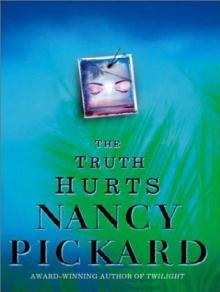- Home
- Nancy Pickard
The 27-Ingredient Chili Con Carne Murders: A Eugenia Potter Mystery Page 20
The 27-Ingredient Chili Con Carne Murders: A Eugenia Potter Mystery Read online
Page 20
As Mrs. Potter exited the gate of Saguaro Ranch, where the FOR SALE sign hung, she wished she’d gotten one last look at those magnificent fan-shaped cacti. What an irony it was that the Amorys had right on their property a small fortune in endangered flora, but as it appreciated in black-market value, all they could honorably do was … appreciate it.
Mrs. Potter knocked on many doors, rang many doorbells, left many messages, collected many margarine tubs. By the time she finished, she felt sure that between her and the Ortega girls, they’d managed to reach everybody who might have been a potential victim of her cooking—if that was the culprit.
One of her last stops was at Lorraine and Gallway Steinbach’s home. She had to double back to reach it, because she wanted to save it until last in the hope that she’d catch Gallway there, back from his trip to Tucson with Kathy Amory.
“Tucson?” said Lorraine Steinbach. “Gall’s not in Tucson, Genia.”
Mrs. Potter stood on Lorraine’s front porch. “Well,” she said, feeling acutely awkward, “I wonder where I got that idea.”
“I can’t imagine. No, Gall’s over at your place, has been all day, Genia, helping out in the search for poor little Linda. Won’t you come in, dear? You look plumb frazzled, if you don’t mind my saying so.”
“I don’t mind at all, Lorraine. That’s exactly how I feel.”
“Iced tea?”
Over cool, minted glasses of sun tea, served at Lorraine’s kitchen table, Mrs. Potter relayed the news of Bandy’s death, and of her sojourn through the valley that day in search of “deadly tubs of ptomaine.” Mrs. Potter’s smile was embarrassed. “I’m not making light of this, Lorraine, please believe me. I think I’m half goofy from the heat and from riding around in the car for so long.”
“Have they figured out what killed Ricardo, Genia?”
“I haven’t been home to find out.” Mrs. Potter saw a flash of something that looked very much like malice cross the sweet, plump face of her neighbor. “Lorraine? What are you thinking?”
“I’m thinking that I ought to be ashamed of myself.” And the other woman’s expression did, indeed, quickly alter to one of contrition. “I’m having a hard time grieving over Ricardo, Genia, because the truth is I’ve just been so mad at the man. Now I should feel guilty about that, but I don’t. I guess I’m still mad, can you believe it? I haven’t a shred of decency, I guess.”
“Don’t be silly, Lorraine, of course you do.” Mrs. Potter saw Lorraine’s lower lip tremble and couldn’t help but think, Oh, dear, here we go again.…
“You wouldn’t know about this, Genia, because Lew was such a good, faithful husband, I’m sure, but … oh, I’ve never said this to anyone before … the truth is that the worst part is other people knowing.” She looked up and Mrs. Potter saw the angry defensiveness in her eyes. “I think I could live with his philandering. Well, I have lived with it, haven’t I? And for a lot longer than any of you know, that’s for sure. And do you know what? When he … does that … and nobody knows but me, then I’m kind of okay about it. Then I can pretend I don’t know, or I can pretend it isn’t happening, and he can pretend that I don’t know.…”
Mrs. Potter didn’t move a muscle or make a sound, but she thought, When we wish we could be flies on the wall, in order to overhear somebody’s secrets, we don’t know what we’re asking.
“But the minute somebody else knows and they say so, then everything changes. Before that I was just a wife with a private problem, but after that, I’m a fool. That’s the hardest part, being a public fool. That’s what Ricardo made me when he went up to Gallway that day in the grocery store and told him that everybody knew what was going on and that if Gallway had any respect for me he’d stop seeing Kathy Amory. And I heard that, Genia. Ricardo didn’t know it, but I was just around the corner, where I could hear it. And even that would have been okay, but Gallway knew I was there. And so then we couldn’t pretend to each other anymore. And then we both knew—that the other knew—that everybody else knew.” She glanced up at her guest again. “Like you. And Che. And everybody else I see all the time. And then I had to think about how you’d all been thinking about us and talking about us, and how foolish, foolish, foolish you must all think I am.”
“Oh, Lorraine …”
Mrs. Potter reached out to cover one of the pudgy little hands with her own, but Lorraine withdrew from her touch.
“I hated Ricardo for doing that to us.”
“He wanted to help you, Lorraine.”
“I know that, Genia. But I don’t care what he wanted. I want people to leave us alone. We’re just fine when people leave us alone and don’t stick their noses into our business. I’ve put up with it all these years, I could keep putting up with it. But now, now …”
She looked utterly despairing.
“He won’t quit seeing her. And now that I know the whole town is aware of it, I can’t lift up my head. I hate Ricardo for making it like this. I hate him, and I can’t stop hating him, and I ought to feel guilty about it, and I don’t. Oh, Genia, go home, please.… I’ve made a bigger fool of myself than ever before.”
Mrs. Potter knew she couldn’t offer comfort where it wasn’t wanted, and so she did the most respectful thing she knew to do: she got up to leave.
At the door, Lorraine saw her off with the words, “So he went to Tucson today, did he, instead of to your ranch? And I guess we both know who went with him. Thanks for the information, Genia.”
The bitter, hateful tone sent chills down Mrs. Potter’s spine as she looked back once, then turned around and kept walking to her car.
With all she’d done that day, it was still only noon.
Mrs. Potter had risen from bed very early, planning on seeing Linda’s horse, planning on stopping by Juanita’s house, planning on going out to the windmill to greet the searchers on this second morning. But Bandy’s death had changed all those plans. There remained only one left to fulfill, and she spared a thought for the impossible wish of going home to freshen up first.
Mrs. Potter glanced in the rearview mirror of the Subaru.
She patted a few loose strands of hair into place, pressed her lips together to smooth out what little remained of her lipstick, ran a finger over the crease in each eyelid where gray shadow had glommed up in an unattractive clump. (It was one of the mysteries of life, Mrs. Potter thought, that eye shadow never stayed where you put it. It “traveled,” and no matter where you applied it to begin with, it always ended up in the same place: in the valley where the eyelid met the skin that came down from the eyebrow. It contradicted the laws of physics, eye shadow did, because it regularly defied gravity by moving up the eyelid before sliding down into that valley. She felt she would understand that phenomenon when she learned where socks disappeared and why the telephone always rang when you stepped into the shower.)
Ready or not, eye shadow or no, it was almost time for her to pick up Jed.
CHAPTER 25
They opted for Sally’s Café at the crossroads for lunch.
“Based on your sworn testimony that she serves the best pork tenderloin sandwich in the whole Southwest,” Jed teased.
Mrs. Potter very much appreciated his effort to make her smile; there’d been so little reason to do so for the last forty-eight hours. And after hearing her tale of woe of the last six or seven hours, Jed was doing well, she thought, to still be able to make a small joke. Another thought flitted through her mind as well: this is what companionship is all about, offering solace and comfort to one another, finding a spark of happiness and hope even in the darkest times. This is why people fall, in love, why they live together, why they get married, and why in spite of divorces and deaths, they never give up. And these are dangerous thoughts, these are presumptuous thoughts, and I will put a stop to them at once.
It was hard, though, considering the company she was keeping. Jed seemed to be so relaxed, and so happy just to be in her company, that Mrs. Potter was nearly able to forget how dusty and
grubby she felt in comparison to how nice and clean he looked in his brown cotton shirt, open at the neck, over attractive tan gabardine slacks, topped by a light wool jacket in a brown heather tweed. His feet were shod in sturdy brown leather walking shoes of which she completely approved because they looked as if they had traversed some mud and rocks in their time, which indicated that maybe he spent enjoyable times outdoors and that he was smart enough to wear appropriate footwear in rocky Arizona. Surprisingly, very few of her out-of-state guests were so prescient—otherwise intelligent women showed up at Las Palomas in spike heels, and brilliant CEOs of major international companies came calling in Italian loafers. That was why Mrs. Potter had long kept on hand not only a variety of serapes, but also a small shoe store of men’s and women’s boots and hiking gear in several sizes. Pride of fashion went out the window, she knew, where blisters were concerned. On top of everything else, Jed smelled “simply divine,” as one or two of her friends back East might have said.
“You can only eat pork tenderloin sandwiches in a restaurant, did you know that, Jed?”
“Why, no, Andy,” he said, playing along with her, “I never heard that before. Why is that, do tell?”
“Well, because there’s home food and there’s restaurant food, that’s why. I’m surprised you don’t know that. I offer the pork tenderloin sandwich as proof. Have you ever eaten one in anybody’s home?”
He began chuckling. “No, now that you mention it.”
“Of course you haven’t. It can’t be done. I suspect there must be some sort of unwritten law against it. But if you ever did have one in a private home, it wouldn’t be any good at all.”
“Is that right?”
“That’s right. I don’t know why. No one does. I’ve asked the greatest chefs from Paris to Harrington, Iowa, and they all claim they don’t know. I don’t believe them, of course. They’re hiding a trade secret, something that gets passed down from one short-order cook to another. It’s probably posted in a hidden spot in diners and greasy spoons where the customers would never think to look. Otherwise, we have to assume that something magical happens on the grill in a restaurant, some alchemy that transforms a frozen slab of breaded pork—”
“You make it sound so appetizing, I can hardly wait.”
“—into a succulent morsel of tenderness.”
“There’s a parking space, right in front.”
She laughed, feeling for the moment much happier than she had in such a very long time. “Hungry, are we?”
On the way into the café, they bantered back and forth about what comprised “restaurant food” as opposed to “home food.” Mrs. Potter held that meatloaf could only be prepared at home, “preferably by the mothers of sons,” but Jed maintained that he knew men who swore by certain truck stops’ meatloaf. “Orphans,” Mrs. Potter scoffed. “Obviously. Poor motherless things. Now, sausage and gravy, that’s definitely restaurant cooking.” Jed agreed, and he guessed that crepes also were strictly to be eaten “out,” but Mrs. Potter claimed not only to have had them in people’s homes, but actually to have prepared them herself. “No!” he exclaimed, as he held open the door of Sally’s for her. “Then I suppose you ‘do’ corn dogs, as well?”
Mrs. Potter smiled into his blue eyes.
“Not nearly as well,” she said.
Just as she’d promised, the pork tenderloins overflowed the buns and filled the plates. The breading was light, the meat was tender and juicy, the buns had been slapped on the grill just long enough to get the edges brown and crisp and the centers buttery brown. Fresh, fluted leaves of lettuce hung out the sides of the buns; the sandwiches were thick with sliced tomatoes and onions, creamy with mayonnaise that had been slathered by a generous hand. Potato chips decorated the edges of the plates, and tall glasses of iced tea rose beside them. Jed took a first bite of the sandwich and closed his eyes, a beatific expression spreading across his face.
“Another convert,” observed Mrs. Potter.
He didn’t open his eyes until he had finished chewing and swallowing that bite. Finally, he said, with a look of awe, “Is this what they call an epiphany?”
“I think it’s a little lower on the scale than that.” Mrs. Potter smiled before she raised her own sandwich to her mouth. “More along the lines of a ‘meaningful experience,’ I believe.”
He chewed, looking, as her grandchildren might have said, “blissed out.” After he swallowed again, he said, “Haven’t you people ever heard of low-fat, cholesterol-free diets?”
“Oh, of course,” Mrs. Potter assured him, “and we practice them every second Thursday in March. You’re in cattle country, Jed. Our theory is that the fresh air evaporates the calories.”
“I do believe I like that theory.”
Mrs. Potter assured him that Sally’s pork tenderloin sandwiches were a carefully allotted treat, in which she probably indulged no more than a few times a year. “And which I make up for with carrots and celery lunches for the rest of the week.”
“No sacrifice,” Jed said, holding the sandwich high, “is too great.”
“Precisely.” Mrs. Potter smiled at him. “It’s nice to see that we still agree on the important things.”
“White Tower hamburgers …”
“Steamed clams …”
“And Sally’s pork tenderloin sandwiches.”
He held her glance for a long moment, during which she felt as if a movie of their earlier time together played before her eyes. The years fell away, and the man seated opposite her was still young Jed, so full of exuberant intelligence and curiosity and fun. As that young face faded out, and she saw again the lines and wrinkles of the older one, she felt a stirring of something like tenderness. She, too, had lines and wrinkles, and she knew the pains and joys that had put them there. Mrs. Potter had to restrain an impulse to reach out to smooth the creases between Jed’s eyebrows, and to touch his cheek, as if to say “yes, I know, it’s been hard sometimes, but here we are again.…”
“Andy, I …”
“Yes, Jed?”
The waitress who had taken their orders and delivered their food had trotted off to serve other customers, but now Sally herself appeared and leaned an arm on the top of Mrs. Potter’s side of the booth. She stared frankly at Jed. She’d already quickly greeted Mrs. Potter at the door and offered sympathy for the consecutive tragedies at Las Palomas Ranch. But Mrs. Potter knew—and wasn’t offended by the fact—that it wasn’t possible for Sally to remain morose for any longer a time than it took her to boil a pot of water. The restaurant owner was a stout woman in her mid-fifties, with a broad face that always looked reddened from cooking, and a tightly frizzed blond mass of what she herself called her “beauty shop hair.” Neither she nor any of her waitresses or cooks wore uniforms. Blue jeans and T-shirts were the order of the day, every day, at Sally’s, with only plastic name tags to identify the servers from the served. Sally’s tag displayed her first name in red block letters.
“You must be Genia’s old friend from college,” she said.
Jed looked startled, and Mrs. Potter jumped in quickly to rescue him. “You’re right, Sally, as always. Jed, this is Sally Thompson, who owns this fine establishment. Sally, may I present to you yet another satisfied customer? This, as you no doubt already know perfectly well, is Jed White.”
“Jedders H.,” said Sally with a grin. “Don’t know what the H is for. This is Gossip Central, Mr. White, everybody stops here, and they talk about everything that’s going on, and can I help it if I just happen to be walking through when they say whatever it is they’re saying? It’s not like I try to listen.” She turned to Mrs. Potter in a confiding way, and leaned down until her name tag was even with Mrs. Potter’s right shoulder. “Listen, Genia, you won’t believe who was in here yesterday. Together. At the same table. That old stinker, Gall—”
“—way Steinbach,” Mrs. Potter said, “and Walt Amory.”
Sally pretended to pout. “Well, you’re the stinker! Take the wind out
of my sails! How’d you know that, anyway?”
“Just happened to be driving past, Sally.”
“Well, then you don’t know what they were saying!” Sally retorted triumphantly. She glanced at Jed. “Your Mrs. Potter here doesn’t approve of gossip, I want you to know, but she knows that she can’t stop me from telling it, so I think she’s come to think of me as more like the valley newspaper, sort of a communication link with the world, you might say.” Sally pretended to preen a bit, and Mrs. Potter and Jed both smiled. She bent still closer to Mrs. Potter. “Besides, Genia, this is really interesting. So they were in here together, and you wouldn’t believe what I was hearing. I had to keep walking by, so I couldn’t hear the whole thing, but I was just so shocked I nearly dropped a whole entire bowl of homemade chicken noodle soup on old Mr. Ford in the next booth.”
She hunkered down still further, until she was nearly whispering.
“That awful old Gallway had the nerve to lecture that young Walt Amory on how he ought to keep better tabs on his wife.”
Mrs. Potter couldn’t help it. “What?” she exclaimed.
“That’s what I said! I heard him with my own ears. I heard him say, ‘Walt, you’ve let ’er get completely out of control.’ And he said, ‘You’ve got to keep a tight grip on them.’ Women, he meant! Can you believe it? I almost ran to the kitchen and got a spatula to come back and hit the old goat with it. And then he says, he said, ‘Some men have got what it takes to take care of business, and some men don’t! You can’t handle ’er, Walt,’ he says, ‘that’s obvious, and you’re absolutely right if you think I can.’ Are you just shocked, Genia? Did you ever think Gallway was that arrogant? And then he says, ‘But I don’t know if I want to take ’er on! Got enough on my plate as it is,’ he says, talking about that sweet wife of his! Lorraine would die if she heard him! Why, I was walkin’ by with hot coffee at the time when I heard him say that, and I wanted so bad just to dump it in his lap. See what he could handle after that! What do you think of all that, Genia?”

 The Scent of Rain and Lightning
The Scent of Rain and Lightning No Body
No Body The Secret Ingredient Murders: A Eugenia Potter Mystery
The Secret Ingredient Murders: A Eugenia Potter Mystery The 27-Ingredient Chili Con Carne Murders: A Eugenia Potter Mystery
The 27-Ingredient Chili Con Carne Murders: A Eugenia Potter Mystery Twilight
Twilight Marriage Is Murder
Marriage Is Murder I.O.U
I.O.U The Virgin of Small Plains
The Virgin of Small Plains Generous Death
Generous Death The Whole Truth
The Whole Truth The Blue Corn Murders
The Blue Corn Murders Say No to Murder
Say No to Murder Confession
Confession Dead Crazy
Dead Crazy The Truth Hurts
The Truth Hurts Bum Steer
Bum Steer